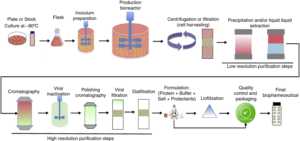Career in Biomanufacturing Sector
If you are looking for biotechnology job opportunities, Biomanufacturing filed is an emerging field that offers a large number of career opportunities for you.
Biomanufacturing is a process of manufacturing commercial products with the application of natural or engineered biological systems. The harnessing of such biological things enables us to manufacture products using the complexity and power of nature, which otherwise cannot be built using non-bio, chemical, or synthetic processes. Biomanufacturing uses biological systems like cell cultures and microorganisms to produce commercial biomaterials.
Jobs in the field of Biomanufacturing
A considerable percentage of biomanufacturing is related to medical products, which has been undoubtedly useful in advanced therapies and regenerative medicine. But the influence of biomanufacturing extends far down to history. For a Career in Biomanufacturing Sector, this knowledge are important.
Even before the invention of genetic engineering techniques, people had been using natural cultures of microorganisms to manufacture food products like bread, wines, and cheeses. Livestock and agriculture farming were also biomanufacturing fuels, feedstocks, and other materials required.
Today, biomanufacturing is an interdisciplinary field that combines mechanical engineering, chemicals, software, robotics, microbiology, biochemistry, and also the new members to the field, such as synthetic biology, metabolic
engineering, and functional genomics. Thus providing numerous Career opportunities in the Biomanufacturing Sector.With the emergence of new techniques, the commercial field requires the expertise to design the industry to develop and automate existing processes, allow easy integration into the target industry systems, and provide real-time analysis of manufacturing workflows.
Although the biotechnology industry has been presumably poised for growth for a long time, for many qualified applicants, the biotechnology jobs were hard to find. One reason is that biotechnology encloses a mountain of specializations career choices. With the ever-changing technology, one would not find the “hot” job if you try to match your skills with what is in demand at that moment.
Its high time you step back and understand the trends in the biotech field. What would be most trending right now that will be a game-changer in your career in the biotech industry?
Industries are maturing continuously, and the industries who hired in research or drug development are now recruiting to design the manufacturing facilities that will bring their products to the market. Such jobs often fall under biomanufacturing.
The Career in Biomanufacturing Sector range from bachelor’s degree–level positions in factory operations to Ph.D. roles that require extensive technical knowledge and critical thinking skills to rectify and troubleshoot manufacturing plant problems. Both science and engineering graduates are hired for such positions.
Bachelor’s degree holders are hired as operators for dealing with huge fermenters, filtration, and purification types of equipment. Engineers, as well as master’s degree holders, usually begin their career at the same level, but with the scope of growing to technical support. PhDs, as they are more skilled concerning technical and thinking abilities, rarely be involved in hands-on production jobs.
An often-misunderstood job category – Career in Biomanufacturing Sector
Biomanufacturing jobs are most advertised for operator roles requiring only a bachelor’s degree due to which Ph.D.s look dubiously at this category.
B.Sc.-level positions are advertised in some other categories, whereas job vacancies for Ph.D.s are often filled via networking.
The technological support group is a fundamental part of the production procedure. Also, technical-support tasks would certainly appeal to any person that has a rate of interest in gaining respect and responsibility quickly. Technical specialists are entitled to deal with everyday problems, from analyzing an unexpected decrease in fermenter throughput to checking out feasible sources of contamination in the physical plant. Biotechnology job seekers are often unaware of these career opportunities
Getting into biomanufacturing
It can be difficult to aim for a biomanufacturing career as you don’t get relevant experiences from the university. But as you land on a job in a company, the opportunities will follow you. One could begin his career in quality control and then move to technical support or operations eventually. You should gain leadership quality, teamwork, and problem-solving skills to get hired and to excel in your job.
If you have experience in the pharmaceutical industry, that can also count for your chance to get hired in biomanufacturing jobs. Those who successfully gained the technical and leadership skills along with some management skills can easily climb up the ladder of his career in biomanufacturing.
A bright future for leaders and problem solvers
Biomanufacturing produces a variety of biobased products for the arising bioeconomy. Biomanufacturing begins with the search of biotic materials from which valuable products can be obtained. Biomanufacturing demands knowledge and techniques from many scientific disciplines consisting of microbiology, biology, physics, chemistry, biotechnology, engineering, and modern technology. It consists of genetic modification and also metabolic engineering, plus numerous cell and cell culture technologies.

Bio-manufactured products range from biopharmaceuticals to commercial enzymes, biofuels, ‘green’ chemicals, human tissues, and replacement organs as well as eco-friendly items to substitute those derived from oil. The application of biotechnology in industrial production is not only reshaping how we manufacture the products, but it’s also creating new proposals, such as making use of microalgae to simultaneously scrub nuclear power plant effluent gases as well as process water while making biofuels to run the nuclear power plant. One more instance is anaerobically transforming cow manure as well as other wastes into gases to generate electrical energy.
A career in biomanufacturing venture needs to integrate for a collective initiative to establish high quality in each manufacturing phase. Everyone involved shares the same objective, consistently manufacture high-quality products. Commonly held skill standards, as well as methods, maintain this consistency. Teams create approaches for effectively monitoring manufacturing efficiency. Together, they examine samples to assess each step and consistently manufacture high-quality products.
Manufacturing or Process Technician
Majority jobs in biomanufacturing fall under production. With a Career in Biomanufacturing Sector, Upstream manufacturing technicians deal with cell growth, cell culture, harvesting cells until fermentation. This consists of measuring, blending the reagents as well as chemicals used to synthesize therapeutic drugs. Downstream manufacturing technicians take care of several cleaning as well as purification steps and other processing procedures. They additionally may run the packaging and also labeling tools. Both must keep precise records for regulative compliance. A bachelor’s degree, combined with experience on the production side of the business, can lead to advancement to quality assurance. Those having a degree with experience in biotechnology jobs can apply for such positions.
Validation Specialist
A validation specialist safeguards that all devices, utilities, software applications, and manufacturing procedures are bound to regulations, standards as well as specifications. This work requires establishing the methods or procedures, making use of for recognition, and creating records of the findings. According to Massachusetts Biotechnology Council, validation specialists should have a bachelor’s degree in engineering, scientific or technical field associated with biotechnology, and also at least three years of work experience in a regulatory domain.
Quality Control or QC Technicians
While validation specialists focus on the “tough” side of production, quality control, microbiology technicians, quality assurance, and chemistry technicians examine finished products, in-process samples, and raw materials. These technicians typically have a degree in biochemistry and biology, microbiology, or chemistry, although some companies might accept fresh graduates with a two-year degree in a biotechnology or laboratory discipline who are looking for biotechnology jobs / Career in Biomanufacturing Sector. Operating in quality control calls for an understanding of federal policies and company procedures. If examination results vary from accepted criteria, quality assurance specialists carry out investigations to find out why and suggest restorative action.
Process Engineers
Process engineers are responsible for the layout of biomanufacturing procedures, as well as the setup and technical upgrades of equipment used to make lotions, liquid forms of medicines and capsules. A four-year degree holders are eligible for the same. They design procedures to check product condition during every phase of manufacturing. They may be asked advice to assist in repairing equipment breakdowns. Process engineers manage employees throughout the business, in addition to regulatory agencies, investors, and consumers. They must have strong project management as well as interaction skills.
Shared Skills and Attributes
In addition to being self-motivated, personal responsibility and also liability goes to the top of this checklist. Candidate should have an unstoppable desire to discover as well as appreciate good manufacturing practices, or GMP: paperwork, tidiness, quality control treatments, equipment verification. Desired abilities include the capability to function individually and also with a team, attention to information as well as excellent interaction skills, both written as well as oral.
Conclusion
A career in biomanufacturing sector places you at the center of a sector that utilizes cells of living organisms to generate insulin, vaccinations, as well as life-saving drugs. This includes treatment for anemia, blood clots, and cancer cells. Although biomanufacturing companies work with scientists with advanced degrees for research, they additionally depend upon specialists with two-year degrees and engineers as well as a monitoring team with four-year degrees.
Editors Notes: Career in Biomanufacturing Sector, Career in Biomanufacturing, Jobs in Career in Biomanufacturing Companies.
Author: Namitha Thampi & Tuluma







































my dream has always being a scientist, i studied Chemistry and Microbiology for four years i fell deeply in love with science during practicals , because that is where i saw the mystery of science same as the understanding the the theory inside science.